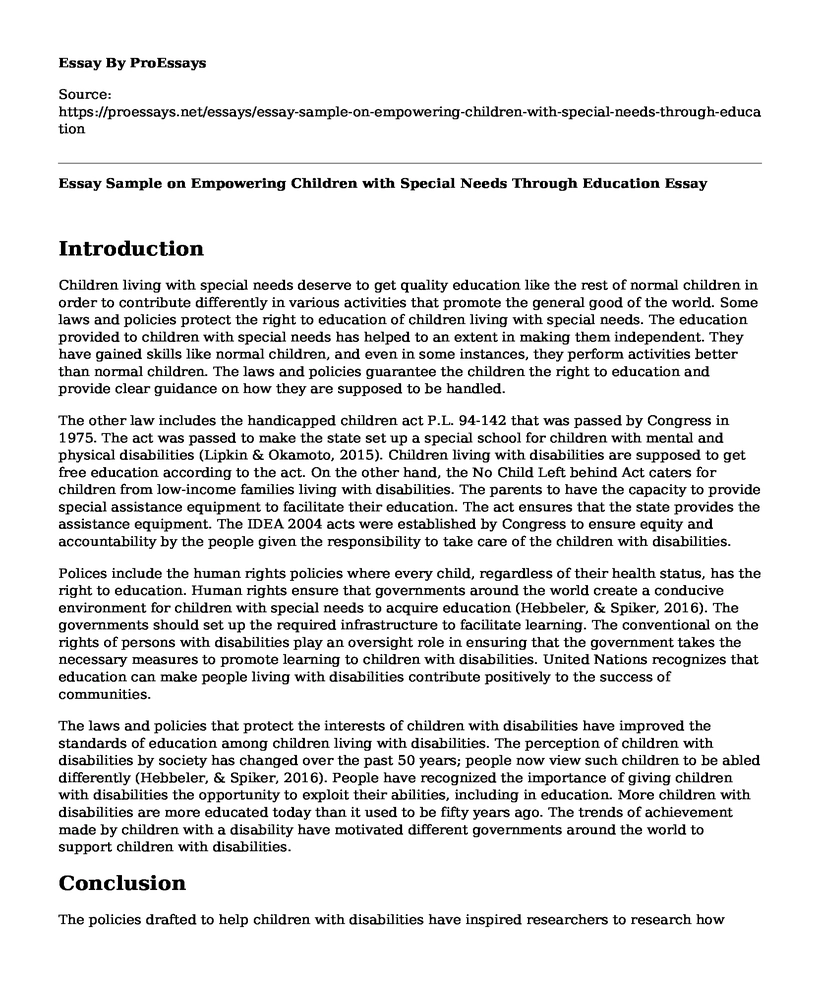Introduction
Children living with special needs deserve to get quality education like the rest of normal children in order to contribute differently in various activities that promote the general good of the world. Some laws and policies protect the right to education of children living with special needs. The education provided to children with special needs has helped to an extent in making them independent. They have gained skills like normal children, and even in some instances, they perform activities better than normal children. The laws and policies guarantee the children the right to education and provide clear guidance on how they are supposed to be handled.
The other law includes the handicapped children act P.L. 94-142 that was passed by Congress in 1975. The act was passed to make the state set up a special school for children with mental and physical disabilities (Lipkin & Okamoto, 2015). Children living with disabilities are supposed to get free education according to the act. On the other hand, the No Child Left behind Act caters for children from low-income families living with disabilities. The parents to have the capacity to provide special assistance equipment to facilitate their education. The act ensures that the state provides the assistance equipment. The IDEA 2004 acts were established by Congress to ensure equity and accountability by the people given the responsibility to take care of the children with disabilities.
Polices include the human rights policies where every child, regardless of their health status, has the right to education. Human rights ensure that governments around the world create a conducive environment for children with special needs to acquire education (Hebbeler, & Spiker, 2016). The governments should set up the required infrastructure to facilitate learning. The conventional on the rights of persons with disabilities play an oversight role in ensuring that the government takes the necessary measures to promote learning to children with disabilities. United Nations recognizes that education can make people living with disabilities contribute positively to the success of communities.
The laws and policies that protect the interests of children with disabilities have improved the standards of education among children living with disabilities. The perception of children with disabilities by society has changed over the past 50 years; people now view such children to be abled differently (Hebbeler, & Spiker, 2016). People have recognized the importance of giving children with disabilities the opportunity to exploit their abilities, including in education. More children with disabilities are more educated today than it used to be fifty years ago. The trends of achievement made by children with a disability have motivated different governments around the world to support children with disabilities.
Conclusion
The policies drafted to help children with disabilities have inspired researchers to research how children with disabilities can be helped. The laws have made children get opportunities to get skills that could not be able to access without acquiring education (Wilmshurst, & Brue, 2018). The education systems have been improved to cater to the needs of disabilities with special needs. The policies and laws have helped in protecting the rights of children with disabilities. The researched strategies used in education and care for children with disabilities include the separation of children depending on the disabilities that they have. The separation is facing care because experts can care for the children depending on their skills. The other strategy is coming up with their curriculum that caters to their needs.
Reference
Hebbeler, K., & Spiker, D. (2016). Supporting young children with disabilities. The future of children, 26(2), 185-205.
Lipkin, P. H., & Okamoto, J. (2015). The Individuals with Disabilities Education Act (IDEA) for children with special educational needs. Pediatrics, 136(6), e1650-e1662.
Wilmshurst, L., & Brue, A. W. (2018). The complete guide to special education: Expert advice on evaluations, IEPs, and helping kids succeed. Routledge.
Cite this page
Essay Sample on Empowering Children with Special Needs Through Education. (2023, Feb 27). Retrieved from https://proessays.net/essays/essay-sample-on-empowering-children-with-special-needs-through-education
If you are the original author of this essay and no longer wish to have it published on the ProEssays website, please click below to request its removal:
- Interactive Teaching Using the Technology-Oriented Framework
- Essay Example on Community Colleges
- Essay on Personal Learning Style
- Summer Scholarship in County Community College
- Background LDP Case Study
- Essay Example on Black, White & Red, Smile Baby: Cognitive Stimulation Toy for Babies
- Essay Sample on Digital Literacy: Protecting Your Digital Reputation in Education







